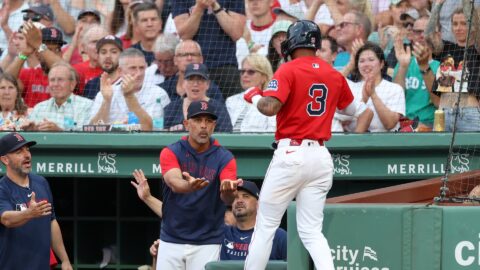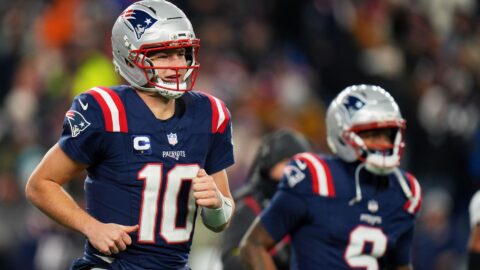This re-education process has been really fun, and it's been very interesting to look at each of Bill Belichick's NFL drafts over the past two weeks. So, as this series comes to a close, let's take a glance at Belichick's 2000 class, which featured the single greatest pick he's ever made.
Check here for the looks at 2009, 2008, 2007, 2006, 2005, 2004, 2003, 2002 and 2001.
Big Storyline
Work with us here because this is a bit of a stretch, but Belichick technically used his very first pick as the Patriots coach on himself. Belichick was hired in New England shortly after his stunning resignation as New York's head coach, which caused the Jets to demand compensation from the league. As a result, the Patriots were forced to send their first-round pick in the 2000 draft to New York. Owner Robert Kraft didn't seem to mind because he finally got the coach he wanted to run his organization.
Best Pick
If the Patriots knew Tom Brady was going to be Tom Brady, they wouldn't have passed over him six times in the draft. But there, waiting at the 199th selection, was that everyday guy who would eventually transform into one of the greatest quarterbacks the game had ever known. Brady was a skinny kid coming out of Michigan, a program that gave him a chance but was always looking across the room for something better. For 198 picks in the draft, so was everyone else.
Brady worked his tail off, starting out as a fourth-stringer — think about that, a fourth-string quarterback wouldn't have even made the Patriots' 2009 roster — and eventually replacing Drew Bledsoe in 2001. The rest of this story will involve a shrine in Canton.
Worst Pick
Belichick's first real draft pick was used on Hawaii offensive lineman Adrian Klemm (second round, No. 46 overall), who was a spot starter at right tackle and guard for five seasons. Klemm provided depth but was otherwise forgettable. That's probably not what Belichick was hoping for when he turned in his first Patriots-emblazoned draft card.
The Rest of the Picks
Running back J.R. Redmond, third round, No. 76 overall: Redmond had a decent rookie season with 532 yards from scrimmage and three touchdowns, but he'll best be known for his clutch performance during the Patriots' game-winning drive in Super Bowl XXXVI. The Arizona State product caught three passes for 24 yards to help get the Patriots into field-goal position. Redmond spent three seasons with the Patriots before playing in Oakland for two years.
Offensive lineman Greg Robinson-Randall, fourth round, No. 127 overall: The Michigan State product was the Patriots' starting right tackle throughout 2001 and had a steady career in New England before getting traded to the Texans in 2003. He also spent time with the 49ers, Rams and Browns, and he is playing arena football these days.
Tight end Dave Stachelski, fifth round, No. 141 overall: He wound up on the Saints' active roster in 2000 and was out of football after 2001. Another draft, another tight end.
Defensive tackle Jeff Marriott, fifth round, No. 161 overall: He might have been better served going into the hotel business.
Cornerback Antwan Harris, sixth round, No. 187 overall: The Virginia product was selected one pick after linebacker Adalius Thomas. Harris had a good five-year run with the Patriots, working on special teams and filling in with the secondary. He is also part of one of the great highlights in the history of the franchise. After the Pats blocked a field goal in the 2001 AFC championship game in Pittsburgh, Troy Brown pitched the ball back to Harris, who scored a 49-yard touchdown that gave the Patriots a 21-3 lead in the third quarter.
Defensive lineman David Nugent, sixth round, No. 201 overall: Years from now, he'll be able to tell his grandchildren that he was drafted two picks after Brady … so he's got that going for him, which is nice. Nugent had a brief stint on the team's active roster, but the Purdue product never panned out.
Linebacker Casey Tisdale, seventh round, No. 226 overall: Tisdale didn't make the team and never played in an NFL game.
Running back Patrick Pass, seventh round, No. 239 overall: One of the most celebrated football players in the state of Georgia, Pass had himself a fine career in New England, too. He spent parts of seven seasons with the Patriots and also got a weeklong run last training camp before retiring. Pass was a fullback and special teamer, and he finished his career with 128 rushes for 526 yards and three touchdowns. He also caught 66 passes for 570 yards and one touchdown.
Who They Missed
There were a number of good players taken after Klemm, including wide receiver Jerry Porter (No. 47), cornerback Jason Webster (48), safety Deon Grant (57), linebacker Marcus Washington (59), center Brad Meester (60), guard Bobbie Williams (61) and linebacker Mark Simoneau (67).
Bottom Line
The Patriots could have used the rest of their draft picks on the entire cast of Varsity Blues, and it still would have been a great draft because of that quarterback.



